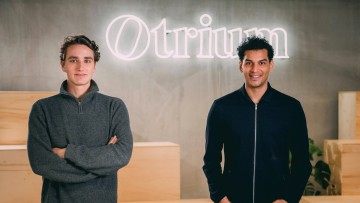News
Meet The Dutch Entrepreneurs Who Just Raised $26 Million To Sell End-Of-Season Clothes

Just a year ago, in May of 2019, Otrium raised an $8 million Series A round, and with the seed round and the latest $26 million Series B, the total equity financing amounts to $37 million.
9 SEPTEMBER 2021
In 2013, Netherlands-natives and recent grads Milan Daniels and Max Klijnstra launched a somewhat successful sweater brand in Amsterdam. The two were selling thousands of sweaters in over 20 countries, and doing 4-6 collections per year. What they eventually noticed, however, was that their warehouse was filled with a vast amount of items from previous collections, even after they’d already done their sale.
Daniels and Klijnstra decided to look into solutions for these end-of-season clothes, so they talked to stock buyers, e-commerce sites that offered flash sales, physical outlet centers, and large outlet malls.
They eventually learned that every brand had the problem of unsold inventory, that stock buyers and flash sales took very high margins, and that it was difficult for many brands to break the barrier to market entry at physical outlets.
So, in 2015 they launched Otrium, an online marketplace for end-of-season clothes that allows brands to sell their unsold inventory at cheaper prices.
In late May of 2020, Otrium announced that it had raised €24 million in Series B funding, in a round led by Eight Roads Ventures, with existing investors Index Ventures and Hans Veldhuizen participating.
“We are trying to change the perception that clothing that is usually 3 months or 6 months at full price and after it’s seen as worthless” Milan Daniels, cofounder and co-CEO says. “We wanted to build a platform where these items get a chance at being bought at a price that is cheaper but still values all the resources that went to the product.”
Old clothes ending up at landfills is still a large problem. According to the EPA, 11.2 million tons of textiles were dumped into landfills in 2017. Governments are taking a more staunch approach to this practice, and now enforcing laws that forbid brands of destroying these goods. In January of this year, France introduced a law that bans destroying designer clothes and luxury goods.
Nonetheless, the problem of certain clothes being pushed down the ladder from a physical store, to an outlet, to a landfill still exists.
“If the hot potato keeps getting handed over to somebody else and not getting sold, it will eventually end up in landfills,” Daniels says.
The Amsterdam-based enterprise has 100 employees and over one million users. It works with 200 brands, ranging from small local labels to fashion giants like Vans, Puma, and Guess.
Otrium makes money in two ways: by charging commission on successful transactions, as well as by offering full logistics service, meaning a lot of the goods that they sell are physically in Otrium’s distribution centers.
Though the company doesn’t release revenue numbers, Daniels says that even prior to the coronavirus (which has caused a spike in online sales mostly due to physical stores being closed), Otrium was growing 10% month over month.
The company’s main storage hub and what they call a mother facility is a 50,000 square meter- warehouse near the German border, from where Otrium ships the products.
Daniels says they plan to open new hubs to offer quicker shipments, next day delivery in core markets that we’re active, with Otrium recently announcing the launch of its UK site, adding to its presence in the Netherlands, France and Germany.
Milan Daniels and Max Klijnstra, who have been friends since elementary school, and who serve as cofounders and co-CEOs of Otrium, made the 30 Under 30 retail and ecommerce list in 2019.
Just a year ago, in May of 2019, Otrium raised an $8 million Series A round, and with the seed round and the latest $26 million Series B, the total equity financing amounts to $37 million.
More from Otrium
See all articles
As a global company, we don’t want to limit ourselves to just one office or location. Read on to hear about our move to a digital HQ.Otrium was dreamt up as a digital-first company and we’ll always be that way. That’s why we’ve launched our HQ in the cloud.. It gives our employees, the O-team, the freedom and flexibility to carry out their work however suits them best. It also reaffirms our global, inclusive mindset.Beliefs
We hold four important beliefs that were the foundations of creating a HQ in the cloud. Firstly, we have a high-performance culture – we trust our teams to always deliver the best work. We understand that output is more important than the hours put in or the location the work was carried out in.Secondly, we already do everything in the cloud – our meetings, documents, daily communications (next to our communication in real life or in our hubs). It’s all online so it makes sense to cement this with an HQ in the cloud.Thirdly, we see all our hubs around the globe as equally important. All Otrium employees should receive the same employee experience. Last but not least, we see our hubs as social places where we can collaborate, concentrate and create. And we don’t want this process to stop just because our teams are in different cities or timezones. And everyone gets to choose the work model that’s best for them – and can change their work model twice a year to reflect their lives and changing circumstances as required.Working models
The Otrium work models include: remote first, hub first and a hybrid version of the two (50/50). With remote first, employees are 90% remote and will mostly work from another location other than our hub (so not necessarily working from home). With hub first, you’ll work from a hub for 80% of your time. We ask our O-team to keep working remotely for 20% of their time, to stimulate our digital way of working, productivity and to decrease commuting. The third model is our hybrid model, meaning you work 50% remote and 50% in one of our hubs.Freedom and flexibility
Finally, along with our HQ in the cloud, Otrium gives our team the freedom and flexibility to work remotely for eight calendar weeks per calendar year from another country than where registered on the employee’s contract. This could include working from another Otrium hub or location of choice.When dealing with different time zones, we make sure we document as much as possible. We use Notion as our source for company-wide info, our employee handbook, team pages and for all meeting notes, slides and recordings. Whether it’s 8am in Amsterdam or midnight in Auckland, all our information will always be there – in the cloud.Milan adds: “The future of work is flexibility. We’re building a truly global and diverse team. To do that we’ve created a model that adapts to people’s lives, instead of a one-size-fits-all model, which doesn’t reflect the way people want to work now. We’re giving our people the choice – in when, how and where they work. With our HQ in the cloud, we’ve developed a truly flexible working model that works for everyone, wherever they are in the world and whatever their personal circumstances. Our HQ in the cloud is the future of flexible working.”

Otrium, the online outlet marketplace for end-of-season fashion is the fastest growing technology company in the Netherlands.The company, founded in 2016 was awarded the honour by Deloitte’s Fast 50. The awards rank the very best of the technology sector and recognise those companies that have demonstrated exceptional growth in turnover over the last four years.The Deloitte Fast 50 ranking features both private and public listed technology companies that have demonstrated innovative strategies, sound management practices and marketplace vision driving them to achieve the status of high-growth leaders. Deloitte calls on companies from across the technology spectrum to apply for the awards.Otrium was founded by Max Daniels and Max Klijnstra in 2016 to offer a digital solution to the enormous amount of unsold stock in the fashion industry.* The company solves this by smartly connecting supply and demand of existing unsold seasonal inventory.In 2019, Otrium was honoured in the Rising Star category, recognising the most promising up-and-coming companies who have been in business less than 4 years.Milan Daniels says: “We are humbled to have been recognised in this way. Even more so because there are so many extraordinary businesses emerging and scaling in the Netherlands. It’s an exciting time and it’s only the beginning – we are on a mission to tech-enable designer brands to make sure every item of clothing is worn. There is much more work to be done.”Ivo Meij, Senior Manager at Deloitte: “We had no doubt last year when we awarded Otrium a Rising Star Award that we would be seeing the company rank very highly this year. We are very happy to see them follow in the footsteps of many other incredible Dutch scale ups and look forward to seeing how the company grows in the future.”

Our tech-enabled insights help over 200 brands with their outlet stores on the Otrium app sell their unsold inventory.Any brand of any size can set up their own store on Otrium in a matter of days. The brand partners can then run and optimise their own outlet store with ease. Otrium’s managed marketplace gives brands full control over pricing, merchandising, visibility and placement.New features continue to be rolled out to serve brands’ needs. The Otrium team is continually thinking ahead to find ways to add value for brand partners and build the best possible end-of-season outlet for brands. The features go towards fixing, once and for all, the costly economic and environmental challenge of unsold inventory.
Abonnez-vous à notre newsletter
Recevez les toutes dernières promos, marques et nouvelles pièces.
Otrium
Service clients
Service clients
© 2016-2025 Otrium, à l’exception de certains contenus fournis par des tiers
